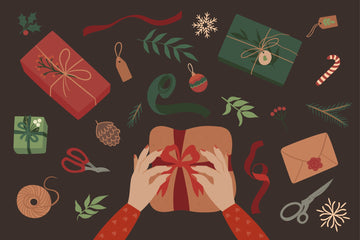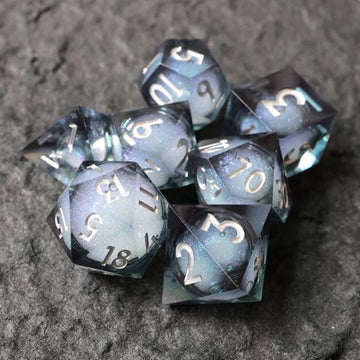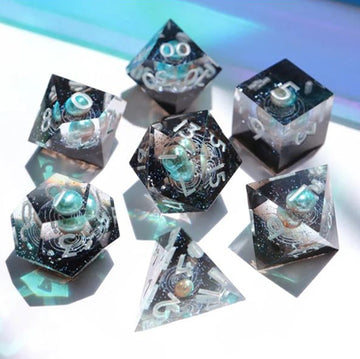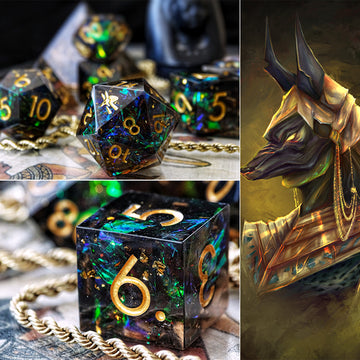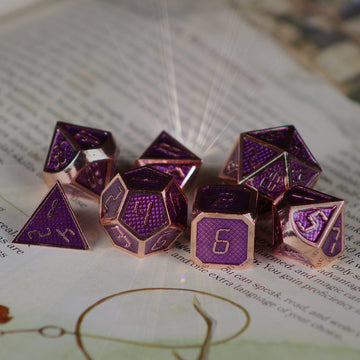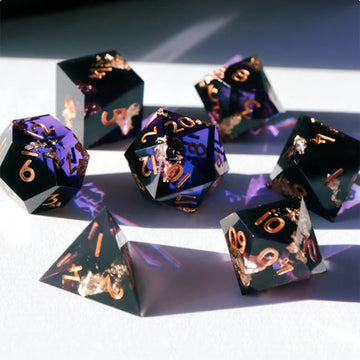Don't Play DnD? Don't Fret! We've Got You Covered
You have a friend/sibling/niece/grandson/what-have-you that's in love with Dungeons & Dragons, so you want to buy them a gift associated with the game, but you feel intimidated because you don't know the first thing about D&D.
Sure, there are hundreds of different gift guides out there, but they're all written for people who already understand the jargon. What the heck is a DM and why do they need a screen? What does "nat 1" mean? What dice are necessary and why are they necessary at all?
Undoubtedly, you can place your faith in the experts and grab something that looks cool, but you want to know what it is that you're buying. You want to have faith you're getting the recipient of your gift something they can actually use, something they might actually enjoy. And you don't want to have to default to the tried-and-true gift card to do it!
But when you search things like "What is D&D?" you get so many results that comprehending where to even start is nigh on impossible.
That's where this blog comes in.
It's exceptionally difficult to imagine what a game of D&D truly looks like until you've had the opportunity to sit down and watch one unfold. Unfortunately, I can't give you the pleasure of a real D&D game, but I can give you a rundown on the basics. Hopefully, by the time this blog post slides into the gift guide portion, you'll have enough ammunition to accomplish your gift-giving goals with confidence!
Table of Contents
- How to Apply Rules to "Infinite Possibilities"
- Campaign vs Session
- The Fantasy Races and What They Mean
- The Fantasy Classes and What They Mean
- Meet the D&D Dice
- How to "Speak D&D"
- How Can You Play Such a Large-Scale Game on a Chessboard?
- Why Does a DM Need a Screen?
- DnD Gift Guide: What to Get DnD Players
- Conclusion
How to Apply Rules to "Infinite Possibilities"

When people say DnD is a game of infinite possibilities, they aren't kidding! Your only true limit is that of your imagination.
So how on earth can you apply rules to that?
The answer: use numbers and statistics to define the realities of your world. In short, this game uses numbers as representation.
Is your character extremely charismatic? That charisma is represented by a high number.
Is your character weak and frail? That lack of strength is represented by a low number.
Dnd has a static list of skills, abilities, and talents to which players assign a number. The higher the number, the greater their character's skill and power.
If this is the case, why don't players just give their characters high numbers across the board? What number is too high? What's too low?
This is why dice are important.
While you do get to decide where your numbers go, you do not get to decide what those numbers are. You have to roll for them. This game also has rules that dictate what type of die you can use, meaning your starting number can only be as great as that die's maximum.
It's kind of like building a puzzle. You don't get to decide the shape and size of each puzzle piece, but you do get to decide what puzzle you buy, what strategy of assembly you'd like to use, and which pieces to put together first.
As your character practices and gains experience, these numbers get higher, reflecting your character's increase in skill and maturity.
Campaign vs Session
At its heart of hearts, DnD is a story-driven game. Playing a game of DnD is, in essence, co-authoring a messy, meandering, and personally-endearing oral story with a bunch of other people.
So when a group of D&D players sit down to play a game of D&D, they must first decide what story they want to tell. Will it be fantasy or sci-fi? Will it be serious or silly? When they do this, they are choosing their campaign. Think of a campaign as a novel. Now think of a session as a single chapter in that novel.
A single session begins when everyone sits down to play the game, and it ends the moment everyone quits for the day. When a session ends, the game is not over. When a campaign ends, so too does the game.
A oneshot is a campaign that can be played in a single day. In essence, it is a short story: a book only as long as a single chapter.
The Fantasy Races and What They Mean

© Wizards of the Coast
Dnd race has absolutely nothing to do with what we traditionally think of when someone utters the word "race." Dnd is a fantasy reality, so "race" refers to what fantasy race a character is. I.E. are they human or an elf? Are they a gnome or a dwarf? Definitely think Lord of the Rings with this one.
The game also uses the word "species" to refer to the same thing. There are a certain amount of races/species in DnD, and in most cases players get to choose which one they'd like their character to be.
The Fantasy Classes and What They Mean

Again, what we think of when we hear the word "class" doesn't apply to D&D's primary definition. A D&D class is loosely similar to a job, and it is used as a guideline for how a single character interacts with the world (primarily in terms of magical and/or martial prowess).
There are three types of classes: spellcasters, martial classes, and half-casters. Spellcasters are exactly what you think they are: characters that can use magic to cast spells! Martial classes are those who prefer to use their fists and weapons instead of magic. Half-casters are somewhere in-between.
Just as with race/species, there is a finite number of classes to choose from, each with different skills, strengths, and weaknesses.
Meet the Dice
Now that you have a basic understanding of DnD, let's meet the dice!
There are 7 different dice necessary in a game of Dnd. As such, the dice set Dnd players need is aptly called a "7-dice set." A 7-dice set consists of the following: a d4, d6, d8, d10, d%, d12, and d20.
The small "d" stands for "die" or "dice" depending on the amount you have. The number that follows the letter d reflects the number of sides that specific die has. Therefore, "d4" stands for "die-4," which is itself short for "4-sided-die."
Easy enough, but what the heck is going on with "d%"?? Contrary to appearances, that's not a typo. The percent sign is simply shorthand for the word "percentile." While all the other die names are read exactly as they appear ("dee-four," "dee-six," "dee-eight," etc.) this die is the exception. This is read "percentile die" (or "percentile dice" if you have more than one).
Any number that appears before the letter d is simply used to show how many dice there are. So, for example, 3d4 is "three four-sided dice" while 8d6 is "eight six-sided dice." Easy.
So why do you need seven different dice in the first place? For the most part, it's to determine probability as well as how much damage is dealt, blocked, or undone. Not all options are as simple as "A or B," and not all spells/attacks are as powerful. More power = greater amount of dice with a greater amount of sides.
How to "Speak D&D"
There's a loooott of jargon associated with this game, and you will definitely encounter some of it when looking at anything related to D&D, so I'm just going to cover those that crop up the most often.
DnD, Dnd, D&D = Dungeons & Dragons

© Wizards of the Coast
This is the easiest of all, especially since I've been using them all throughout the post (I do run a dice company, after all. SEO is a necessary evil!). These are all abbreviations for Dungeons & Dragons. They're all pronounced identically. Whether you prefer the enunciated "dee and dee" or the stress-less "dee nn dee," it doesn't matter: it's correct.
DM = Dungeon Master
The Dungeon Master is sometimes referred to as the "Game Master" or the "GM." In certain ways, playing a game of D&D is distantly similar to filming a movie. The players are the main characters. They get to decide how their characters act, what they say, where they go, who they interact with, who they like and dislike, and so on and so forth throughout the duration of the film.
The DM, however... the DM has to play almost every supporting role—every antagonist, monster, villager, acquaintance, shop keep, friend, family member, and romantic interest—in the movie all by himself. He's also responsible for set design, including landscapes, cities, towns, villages, houses, taverns, and more. This is all on top of seeding the world with interesting clues, puzzles, traps, and tricks. He creates or manages the fantasy world's culture, religion, and politics, and is even in control of the weather! Without doubt, no shoes are harder to fill than the DM's.
It is important to note, however, that a good DM does not control the entire game, he manages it. It's much like parenting! Good parents don't control every aspect of your life, but they do inform you that you probably shouldn't stick a fork into that socket. And they're definitely the persons you turn to when you need to ask permission.
Player
There's no shorthand for this term, but it's nonetheless important that I cover it. This refers to all the real, human people physically sitting down at the table to play a game of DnD but for one exception: the DM. Though he too is playing the game, the DM is not referred to as a player. Although this word should strictly refer to an actual human person, it is sometimes used to refer to a person's fictional character. Context will usually reveal which one it is.
PC = Player Character
This is the word that refers to the fictional character someone is playing and not the players themselves.
NPC = Non-Player Character
This is a term used in DnD and in video games. It simply refers to any character not controlled by the players. In D&D, NPCs are controlled by the DM. They are those friends, romantic interests, shop keeps, villagers etc. I spoke of earlier.
Party = Adventuring Party
The term "adventuring party," which is almost exclusively shortened to just "party," refers to the group of player characters within a single campaign. That said, this term frequently blurs the line between reality and fantasy, referring at once to both the players and their characters. It is not at all uncommon to hear someone say something like "my party and I defeated a troll yesterday." A party might rarely include an NPC or two if that NPC is a regular member of the group.
AC = Armor Class
Almost everything in D&D has an Armor Class. Many different things can affect an individual or an object's AC, but the gist of it is that said individual/object will have a number you need to beat in order to hit it. Enemy has a 15 AC? You need to roll a 15 to strike faster than this enemy can dodge. Wooden wall has an AC of 20? You need to roll a 20 or your attack doesn't have enough strength to do damage. Some Dungeon Masters strictly require that you roll over an enemy's AC in order to do damage: meeting it will not be enough.
Nat 1 and Nat 20 = Natural 1 and Natural 20

© lanajbanana
This here is the bread and butter of many a D&D-related joke.
This relates to the d20. The d20 is the die most frequently used to determine probability. It is for this reason that the d20 is the face of D&D, traditionally considered the most important die in the entire game. It is a d20 that you will be rolling to determine whether or not you can meet or beat someone's AC. You will roll it for so many more reasons than just this.
If you roll a d20 and it lands on a 1, this is called a "natural one." Just the same, if you roll a d20 and it lands on a 20, this is called a "natural 20."
Why? Throughout a game of D&D, you will frequently be adding numbers to or subtracting numbers from whatever result you rolled on your d20. "Natural" simply means your die landed on a true 1 or 20: you didn't add or subtract anything (if the result of your roll is a 20 strictly because you added or subtracted something, that is called a "soft 20").
This is important, because a nat 1 results in a "critical failure," while a nat 20 results in a "critical success."
As I'm sure you can imagine, rolling a "critical failure" is bad. A critical failure isn't just a failure, it's a spectacular failure. Failing is tripping and falling. Rolling a nat 1 is tripping and misjudging the stability of the table you chose to lean on for support, taking the entire table down with you and sending the table's contents careening into your head. It's trying to stop a packet of Kool-Aid mix from falling off a shelf, only to knock a two liter bottle of soda off its shelf: it lands cap first, explodes, and rockets around the isle, knocking yet more two liter bottles of soda off the shelves.
The result of a nat 1 really depends on where a character is and what he's trying to do, but suffice to say he doesn't just fail. If he was attempting to attack someone, he might fall over, drop his weapon, break his weapon, or even accidentally injure an ally! Characters with the "Wild Magic Surge" trait experience what can basically be summed up as a disastrous magical sneeze. The possibilities are endless.
Inversely, rolling a "critical success" is considered good. This is not just a success, this is a tremendous success. You might even have stumbled into greatness!
Succeeding is finishing a project well and on time. Critically succeeding is accidentally discovering the cure for cancer while in the process of uncovering a (very successful) cure for diabetes. It's escaping danger without realizing you were ever in danger. It's being in exactly the right place at exactly the right time.
For this reason, if you are attempting to attack someone and you roll a nat 20, the damage your attack deals is doubled. Just like with a nat 1, there are endless possible results for rolling a nat 20. However, if you were attacking something, double damage will always apply.
It does not always work this way—there are times where a 20 is perhaps too high a roll and situations where rolling a nat 1 doesn't result in any failure at all, let alone spectacular failure (and certainly very few players like it when the antagonist rolls a 20)—but it's such a staple of DnD that many people often choose to play with the rule that a nat 1 is always a failure and a nat 20 is always a success, no ifs, ands, or buts about it.
Crit = Critical
"Crit" is simply shorthand for "critical." Rolling a "critical failure" is often shortened to "crit fail." A "critical success," however, is usually just referred to as a "crit" (although this term by itself can technically apply to both). If you were attacking something, a "critical success" can also be referred to as a "critical hit."
Dice Goblin
This is a comedic term used to refer to dice collectors who have waaaaay more dice then they could ever need. Although a dice goblin's love of dice is frequently likened to an obsession or addiction, this term is seldom ever used as an insult.
How Can You Play Such a Large-Scale Game on a Chessboard?

If you've ever watched Stranger Things, you've probably noticed that the protagonists are playing their game of D&D on a grid board hardly any larger than a chessboard. By now you're probably starting to gather that a game of DnD primarily takes place in the imagination and may consist of an entire world dreamed up by the DM and the players. So how could one tiny chessboard possibly be useful?
If we're being honest... the chessboard isn't ideal. Most people prefer online programs or large, laminated maps the size of an entire table top. But it technically is possible to play a game using only a chessboard, and here's how.
It isn't necessary to draw the entire world. Describing the setting is often enough to give everyone at the table a clear, mental image of where their characters are, just the same as an author using the written word to show you the worlds within their novels. They don't need photos or video, and they aren't asking you to picture the whole world all at once. They do it piece by piece, paragraph by paragraph, page by page. Dnd players do it hour by hour, session by session.
This is precisely why some people don't need a map at all. They're perfectly content to use the theater of their mind to play an entire game. This type of play style is aptly named "theater of the mind."
There are times, however, when a visual is certainly helpful. Most often, this pertains to combat. Combat imposes restrictions on how far you and your enemies can move during a single turn. Just like in reality, there's also a range to a person's weapons and line-of-sight.
A D&D map consists of one inch squares or hexagons. A single shape represents 5 feet. Most characters can move up to 30ft on their turn, or double that amount if they're sprinting, so they need to know exactly how far away their enemies and allies are!
This is also why miniatures, frequently called "minis," are important. Different minis help differentiate friend from foe, and it's also a great way to give a sense of scale. Minis, as well a hand-drawn lines, can also be used to represent buildings and objects, helping players understand their character's field of view and what they're capable of interacting with.
Indeed, for this reason there are many people who refuse to play a game of Dnd without a map.
Why Does a DM Need a Screen?
A DM Screen is a wide-but-squat folding screen that prevents the players from seeing the DM's notes and supplies while simultaneously allowing them to see the DM himself. The reason for its use is simple: preventing spoilers! When you're watching a movie or reading a book, not knowing what's coming is precisely what makes it fun. Since D&D is primarily a story-driven game, it's not much different. If you can see everything your DM is preparing, it takes away the fun.
This item is only necessary if a DnD group is playing a session in-person rather than online. If they're playing online, it's pretty easy for the DM to hide just about anything.
DnD Gift Guide: What to Get DnD Players
Alright, now it's time for the fun part: finding cool loot for your friends and family members! Whether you're looking for D&D christmas gifts or birthday presents, these are some of the best gifts our group of DnD enthusiasts could conjure up.
Gift Idea #1: Dice
This is the obvious first choice, and I'm not just saying that because I own a dice company. Dice are integral to a game of D&D. No dice = can't play. Thanks to this, dice make for a perfect gift whether your giftee is a beginner, veteran player, or anything in-between! Because contrary to expectations, it does help to have more than one set. After all, when you first start the game you may be asked to roll a total of 4d6.
Buying dice for your loved ones can feel intimidating, but it's not as hard as it seems. If you're stressing, I can almost guarantee you're overthinking it. As long as you're buying a 7-dice set, you don't need a set of dice that matches the game, you need a set of dice that matches the person. Do they like pink? Get pink dice. Do they hate glitter? Stay away from glittery dice.
Although some people like to pair their dice sets with campaigns and characters, this is not a strict necessity. The vast majority of D&D players collect dice for the same reason others collect coins or trading cards: they're cool! I, for example, have over two dozen dice sets. Only two of those sets were purchased with specific characters in mind and all sets were purchased because I thought they looked neat. These days, dice are as much "art piece" as they are "useful tool," and dice collectors looooove to use, have, and display them. It's an enjoyable hobby! So if you're thinking "wow, that set looks cool!" your recipient probably will too.
If you're worried about doubling up, I feel pretty confident in saying that there are so many different options that you're hard pressed to buy them something they already have. But if you're especially concerned about it, and if you're recipient hasn't shopped at Awesome Dice before, I can guarantee that they don't have any of the sets featured here as they're exclusive to our store and our store alone.
There are multiple different types of dice including:
Click the links above to explore specific options or click here to explore our entire collection. Rest assured that all of these dice are suitable for any game of D&D.
And if you'd like something really unique, try our dice ornaments!
Gift Idea #2: Dice Bags
For the storage and transportation of all those dice! Dice bags, folders, and boxes are especially helpful accessories if you've purchased a set of gemstone, glass, or metal dice. To prevent damage, these dice should be kept separate from other dice.
Just be sure to pay attention to the listing! Sharp edge dice are almost never standard size. The same is often true of metal and gemstones. So if a listing says a dice box or dice folder is "suitable for standard size dice," that sharpedge set you bought probably won't fit.
A dice set not being of standard size will not prevent their use in a game of DnD.
Gift Idea #3: DM Screen

© 3SonsWoodshop on Etsy
If you know that your recipient is a DM, and you know said recipient enjoys playing in-person sessions, a DM screen can be a worthwhile gift. Buying a DM screen is similar to buying dice. If the functionality is there and it looks cool, your DM will probably love it. Bonus points if it has things like magnets, pockets, built-in dry erase boards, or notes on the inside of the screen.
Traits for the best DM screen include:
- Easy to transport
- Short enough that the DM can see over it while seated
- Yet tall enough and long enough to hide the DM's supplies from his players.
Amazon and Etsy are two great places to look for DM screens.
Gift Idea #4: Journals
Some campaigns can last years, which means there's a looooot of information for a single player or DM to remember. Information about the story, about the world, about their characters and their friends' characters... Note taking can really come in clutch here! Any nice journal will do, especially if it lays open easily, but journals specifically designed for DnD, such as this one here, are particularly nice.
Gift Idea #5: Maps
Dry erase and wet erase maps, along with their subsequent markers, are both great. Just be sure you tell the recipient which one it is! Do not use dry erase markers on wet erase maps (and vice versa).
In my experience, the thinner the map, the better. Thickly laminated maps are difficult to roll up and lay flat. On top of this, they are prone to warping and peeling overtime. Chessex wet erase game maps are some of the best around. They're thin, easy to roll up, easy to flatten out, and easy to clean. Not to mention the fact that they're reversible: hexagons on one side and squares on the other! We have a large, Chessex game map and a set of markers available here.
Gift Idea #6: Spellcards and Spellcard Holders
© Dragon Shield
This one is a personal favorite of mine. There's so much information to keep track of during a game of Dnd. Constantly needing to Google that information can take time and distract from the game. This is why spellcards and spellcard holders can be useful. Players can organize them to suit their needs and find information with just a few flips of a page!
There are several different card holders that are specifically designed for D&D such as these here and these here. That said, card holders meant for holding baseball cards and trading cards will also work. Just look for something that's around the size of a standard, hardcover novel. Anything too much larger will be too cumbersome for frequent use.
To make use of this idea, you'll need to know what class your recipient plays. There's no harm in asking! DnD players love this game. Why would they play if they didn't? I guarantee most DnD players would be thrilled to talk about their characters and campaigns.
You may also want to ask what edition your recipient plays. There are many different versions of D&D. These versions are called "editions" and each one has different rules. Wizards of the Coast (the creators of D&D) have only made spellcards for Fifth Edition D&D, also known as 5e. This is the only suggestion on this list that depends on edition.
Gift Idea #7: Miniatures

© CreeepyPrints
Some people LOVE minis, and if your recipient is one of them, you'll know (or can otherwise easily find out). Like dice, minis are as functional as they are decorative. They're art pieces as much as they are tools, and some people reeeeeally love painting them. Therefore, a gift box containing high quality, unpainted minis and some nice figure paints is sure to delight many. If your recipient has expressed any interest in painting their own miniatures, a gift like this is a great way to get their foot in the door. And for those who aren't interested in painting their own, pre-painted minis still make for useful and valuable gifts!
General consensus is that Citadel Colour, Vallejo, and Army Painters are good places to go for figure paint.
You can find the miniatures themselves on a lot of different websites such as Amazon, Etsy, Wizkids, and Myth Forged.
Gift Idea #8: Adventure Modules
Curse of Strahd © Wizards of the Coast
Adventure modules (also called adventure paths) are basically campaigns. To buy someone an adventure module is to buy them a new story to play. Although these seem like better gifts for a DM, there's no reason you can't gift one to a player. Adventure modules make for great gifts either way!
Like many things on this list, choosing the right adventure module depends on your recipient more than anything else. If they're new to DnD, consider something short (and therefore approachable). If they're a seasoned veteran, they might already have much of the official content, so consider something unofficial. And as always, consider their preferences: horror for the horror fan, heists for the strategist in your life, a nautical adventure for fans of Pirates of the Caribbean, etc.
Follow this link here to see a big list of official D&D adventure modules and this link here to explore a handful of neat, unofficial oneshots.
Gift Idea #9: Supplemental Content
© StoneStrix
Game supplements are things that can be used in any campaign, which are always appealing. This includes puzzles, traps, monsters, magic items, races/species, classes, and more. All make for awesome gifts.
Following this link here will take you to a site with some of these options. We have content in this category as well, which can be downloaded for free here.
If you are interested in searching around for more, one additional term may help you: "homebrew." Homebrew content refers to content that is not created by Wizards of the Coast. It basically replaces the word "unofficial," but doesn't always share the negative connotations commonly associated with the word.
Conclusion
And that's it! That's the game and that's the guide! If there are any Dnd players reading this, please let us know what some of your favorite D&D-related gifts are. There's nothing better for this post than receiving word from yet more DnD players.


